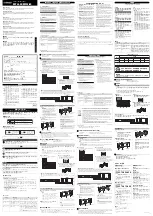
CX-961
3) Focus or tracking AGC
This adjustment automatically adjusts the servo loop
gain of focus or tracking AGC.
The adjustment procedures are as follows:
(1) Inject disturbance into the servo loop.
(2) Sample an error signal (FE or TE) via B. P. F at
disturbance injection.
(3) Compare the signal obtained as mentioned above
inside the LSL and the phase with disturbance.
(4) Adjust a phase difference so as to reach the target
phase value set on the microcomputer.
4) FE bias automatic adjustment
This adjustment maximizes an RFI level by optimizing
the focus point during play and adjust the level using
the RFRP level and phase difference at the disturbance
input of a focus error.
The adjustment procedures are as follows:
(1) Inject disturbance into the focus loop with a
microcomputer command. (Inside the servo LSI)
(2) Detect an RFRP signal level inside the LSI.
(3) Process the relationship between the above RFRP
signal and disturbance inside the LSI and detect the
amount and direction of focus misalignment.
(4) Substitute the detected results for the bias
adjustment item inside the servo LSI.
Besides, this adjustment repeats a series of
arrangements several times in the same manner as
auto (automatic) gain control and improves adjustment
accuracy.
SINE WAVE
GENERATION
CIRCUIT
BPF
+
AVERAGE
PHASE
COMPARATOR
DECISION
WINDOW
DIGITAL
EQUALIZER
A/D
D/A
FEI,TEI
IC301 TC9495FP
43or
46
+
A/D
PEAK DETECTION
DECISION
WINDOW
DIFFERENTIAL
CALCULATION
AVERAGING
BIAS ADJUSTMENT CIRCUIT
+
DIGITAL
EQUALIZER
RFRP SIGNAL
FE SIGNAL
RFRP
FEI
BIAS
CIRCUIT
GENERATION OF
STEP SIGNAL
IC301 TC9495FP
42
43
5) RF level automatic adjustment (RFAGC)
This adjustment adjusts unevenness of the signal (RFO)
level caused by the factor of the mechanical unit and
disk to a fixed value and is performed to aim at
accurate signal transfer. The adjustment is performed
by changing the amplifier gain between the RFI and
RFO.
The adjustment procedures are as follows:
(1) Calculate the PP level of RFRP from the peak and
bottom values of the RFRP level inside the servo LSI.
(2) Set such an amount of amplifier gain as a desired
RFO level by being compared with the reference level
and control the gain of the RF amplifier.
This adjustment is performed in the following timings:
Immediately before setup completion (immediately
before play)
Until focus was out of order during play and then is
recovered
6) Preamplifier stage gain adjustment
This adjustment increments 13 dB the gain of the entire
FAMP (FE, TE and RE amplifiers) according to the
setting of the GVSW terminal when there are few lens
stains or there is remarkably little reflected light of a
disk while playing the CD-RW.
The adjustment procedures are as follows:
If it is judged that the reflection of a disk is considerably
small during setup, the entire RFAMP is incremented 13
dB by switching the GVSW terminal from “H” to “L”.
Besides, if the gain is changed, redo the setup from the
first.
+
LPF
PWM
PEAK
DETECTION
A/D
RFREF
RFRP
BOTTOM
RFI
RFRP
RFGC
RFRP
RFGC
+
-
-
IC301 TC9495F
RFGO
RFO
IC201 TA2150FN
2
52
38
42
20
25
Fig.19:LOOP GAIN ADJUSTMENT
Fig.20:FE BIAS ADJUSTMENT
Fig.21:RF LEVEL ADJUSTMENT
11





































